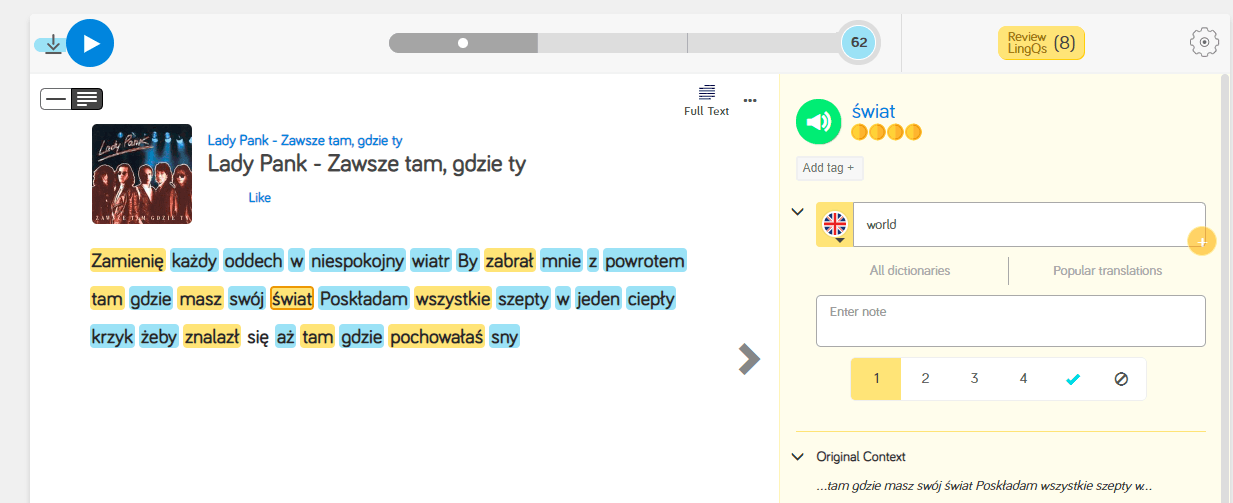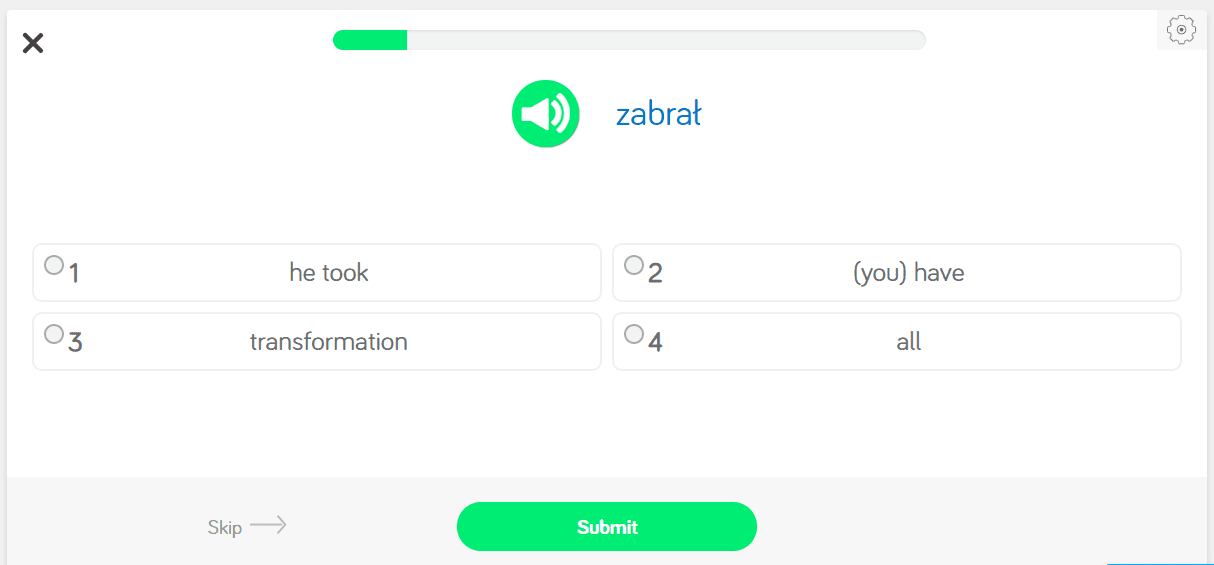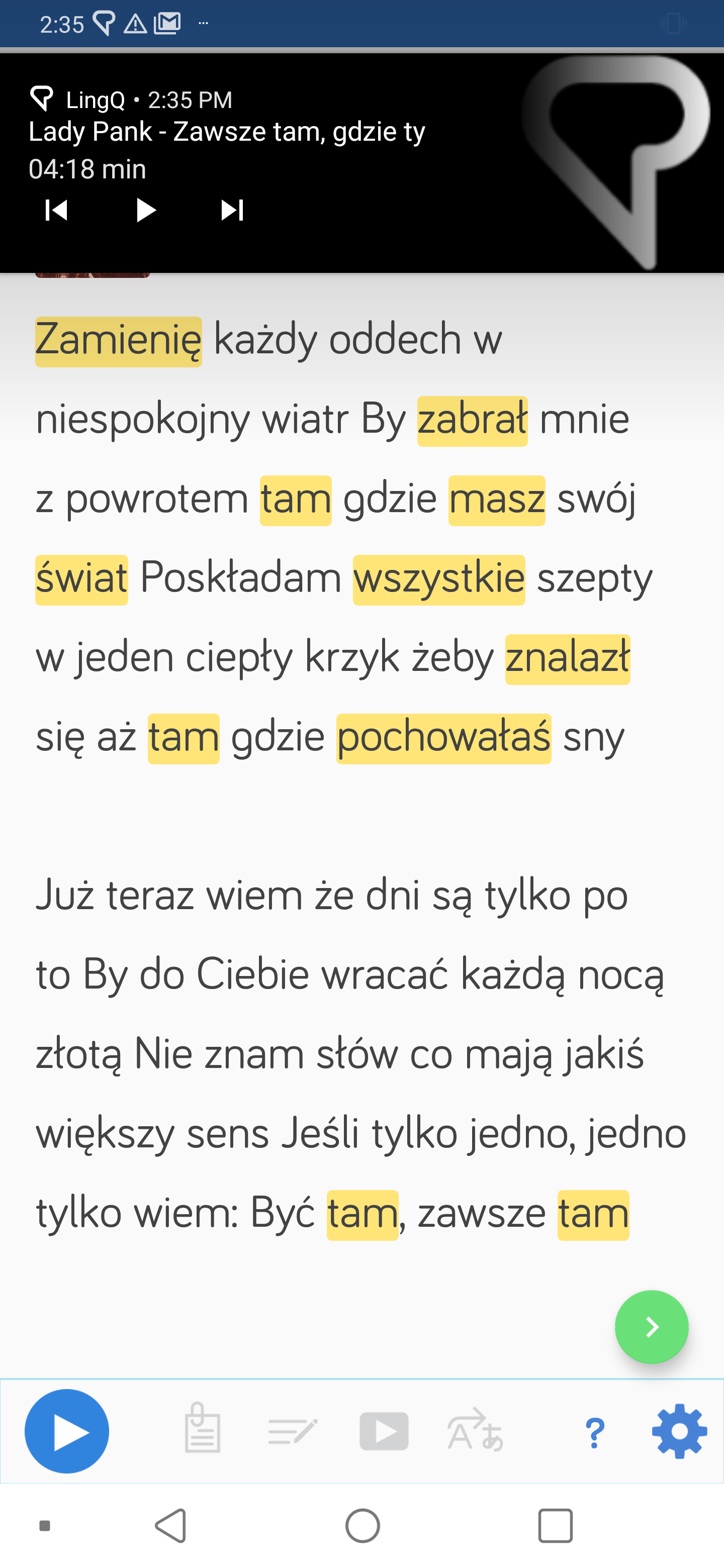Polish Songs and Their Lyrics to Help Improve Your Polish Language Skills
Polish artists create music of all genres. There are popular Polish songs that could be classified as rock, hip hop, dance, pop, folk, metal and all other genres you can think of.
You can easily find a genre that interests you for your own purpose of learning the language. Let’s have a quick look at the related vocabulary:
Muzyka – music
Polska muzyka – Polish music
Piosenka – a song
Hit / przebój – hit
Płyta CD – CD
Nagranie – record
Piosenkarz – male singer
Piosenkarka – female singer
Refren – chorus
Tekst (piosenki) – (song) lyrics
Now, that you have some background we can move on to learning Polish with lyrics.
T.Love – Chłopaki nie płaczą
Here’s an excerpt from the lyrics with a translation:
Mówisz życie jak cukierek
You say that life is like a candy
Gorzkie jest czasami
Sometimes bitter
Mówisz panna zostawiła
You say your girlfriend has left you
Kumple dawno cię olali
Your friends stopped caring about you a long time ago
Ale nie bój nic – minie jakiś czas
But don’t worry – some time will pass
Poczuj chłodny świt, wszystko przejdzie ci
Feel the cool dawn air, it’ll take it all away
(Refren) Uuh, chłopaki
(Chorus) Oooh, boys
Uuh, nie płaczą
Oooh, don’t cry
This song provides quite a few useful slang expressions. “Panna” is a word used for a girlfriend (a more generic one is “dziewczyna”). An equivalent for a boyfriend (usually chłopak) in slang would be “typ” or “facet”. “Kumple” means friends and is plural of “kumpel”. Both are used for male friends. A female friend would be “kumpela” and friends “kumpele”. Another interesting expression is “olać”. It’s a verb that’s very difficult to translate but it means that someone doesn’t care about you. Last but not least, there’s “nie bój nic” which means “don’t worry”.
Popular songs, like “Chłopaki nie płaczą”, are a great way of learning slang and modern vocabulary. Another good source of study materials is disco polo. It’s a Polish music genre which originated in the 80s, characterized by simple lyrics and easy, often catchy melodies (everyone’s favorites on weddings).
Shazza – Bierz co chcesz
Nie mów to niemożliwe
Don’t say it’s impossible
Nie patrz naiwnie tak
Don’t look (at me) so naively
Każdy ma swoje imię
Everyone has their own name
Każdy ma serca dwa
Everyone has two hearts
Lecz nie ja
But not me
To nie ja
It’s not me
(Refren) Bierz co chcesz, wszystko weź
(Chorus) Take whatever you want, take everything
Co tylko mam
All that I have
Bierz co chcesz nawet deszcz
Take whatever you want, even the rain
I z włosów wiatr
And the wind from (my) hair
Nie mam nic do stracenia,
I have nothing to lose
Nie mam nic oprócz Ciebie,
I have nothing apart from you
Nie mów mi do widzenia,
Don’t tell me goodbye
Nie zabieraj mi siebie.
Don’t take yourself away from me
Przy mnie bądź,
Be with me
Zawsze bądź.
Always be
This song, by the once famous singer Shazza, is a perfect way to study the imperative mode (“Bierz!”) and more specifically its negation (“Nie mów”, “Nie patrz” etc.).
The 80s and 90s in Polish music were also decades when a lot of beautiful rock ballads and songs were created. Many of them have moving lyrics but due to their poetic qualities require a lot from someone who’s learning Polish. Fortunately, I’ve found one that’s both enchanting and not too challenging linguistically.
Urszula – Konik na biegunach
Za rok może dwa schodami na strych
In a year, maybe two taking the stairs up to the attic
odejdą z ołowiu żołnierze
the tin soldiers will leave
przeminie jak wiatr uśmiechów twych świat
will go by like wind the world of your smiles
kolory marzeniom odbierze
will take away the colors of (your) dreams
za rok może dwa schodami na strych
In a year, maybe two taking the stairs up to the attic
za misiem kudłatym poczłapią
behind a furry teddy bear will lumber
beztroskie te dni i zobaczysz
these carefree days and you’ll see
że jednak wspaniały był on…
that after all amazing was he…
(Refren) Konik – z drzewa koń na biegunach
(Chorus) Horsie – wooden rocking horse
zwykła zabawka mała huśtawka
a simple toy, a small swing
a rozkołysze rozbawi
but will set you rocking and make you laugh
konik – z drzewa koń na biegunach
Horsie – wooden rocking horse
przyjaciel wiosny uśmiech radosny
a friend of spring, a happy smile
każdy powinien go mieć
everyone should have one
This song includes a lot of useful vocabulary around the theme of childhood and a short lesson in diminutive formation. The form “konik” (horsie) is derived from the word “koń” (horse) just like the word “słonik” (little elephant) is formed from the word “słoń” (elephant).
To be entirely honest I only realized how challenging the lyrics of some Polish songs were when I was writing this article. As a native speaker you understand the references and the word plays, simply appreciating them. Below I’m mentioning two examples to give you an idea of the level of difficulty I’m referring to.
Lady Pank – Zawsze tam, gdzie Ty
Zamienię każdy oddech w niespokojny wiatr
I’ll transform every breath into a restless wind
By zabrał mnie z powrotem tam gdzie masz swój świat
So that it takes me back where your world is
Poskładam wszystkie szepty w jeden ciepły krzyk
I’ll gather all the whispers to form a warm shout
żeby znalazł się aż tam gdzie pochowałaś sny
So that it finds itself where you’ve buried your dreams
Another excerpt with similar qualities comes from “Nie płacz Ewka” (Don’t cry, Ewka) by Perfect:
<iframe width=”560″ height=”315″ src=”https://www.youtube.com/embed/m54WNWCUAE8″ frameborder=”0″ allow=”autoplay; encrypted-media” allowfullscreen></iframe>
Nie płacz Ewka, bo tu miejsca brak na twe babskie łzy
Don’t cry, Ewka as there’s no place here for your womanly tears
Po ulicy miłość hula wiatr wśród rozbitych szyb
On the love street the wind blows among shattered windows
Patrz poeci śliczni prawdy sens roztrwonili w grach
Look, beautiful poets have squandered the meaning of truth in games
W półlitrówkach pustych SOS wysyłają w świat
In empty half-liter bottles they’re sending out SOS messages into the world
Apart from lyrical expressions this stanza also includes a reference to a “półlitrówka” (half a liter bottle) which to me very obviously means a vodka bottle. Both make the lyrics quite challenging.
It’s a pity that many most loved Polish tracks are understandable only to native speakers and people with a level equivalent to that. However, the world of Polish music is wide and vast and there’s plenty of opportunity for language practice in studying lyrics. Here’s a number of other suggestions that can help you learn the language:
- Hip-hop songs such as “Jestem Bogiem”, “Plus i minus” or “My Polacy” (WARNING: be prepared for getting acquainted with Polish swear words)
- More disco polo: start with “Ona tańczy dla mnie” by Weekend and “Jesteś szalona” by Boys
- “Szansa” or pretty much any other song by Doda
Learning Polish Songs Using Lings
Last week, LingQ published a post talking about how to import your favorite K-Pop songs into LingQ to help practice your Korean. Well, you can do the exact same thing using Polish songs!
Let’s take a look by using Lady Pank – Zawsze tam, gdzie Ty.
First, find the lyrics (I use Genius.com) and import them into LingQ. You can also upload audio as well so that you can listen and read the lyrics at the same time.

After you save and open your new lesson. It should look like this:

You can “LingQ” each new vocabulary word or sentence you come across by clicking it. LingQ will automatically save your new vocabulary and create flashcards so you can review them anytime.

Oh, and you can access your lessons on your phone too, thanks to LingQ’s mobile app 😉

Good luck!
***
Magdalena Osiejewicz-Cooper is a native speaker of Polish. She speaks fluent Italian and French. She is currently self-studying Spanish.
***
